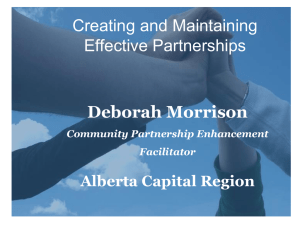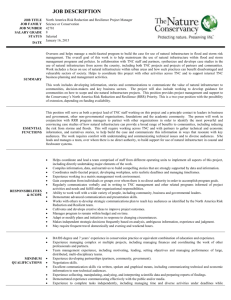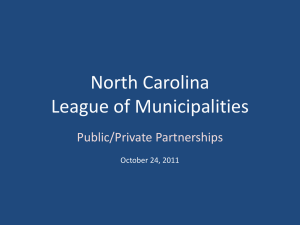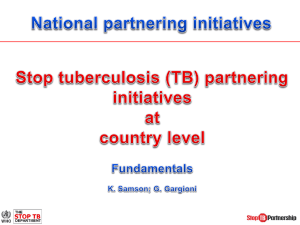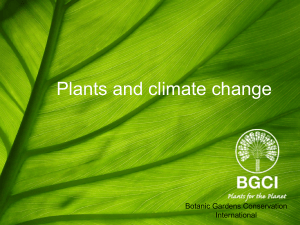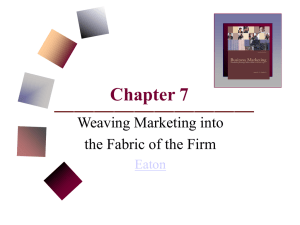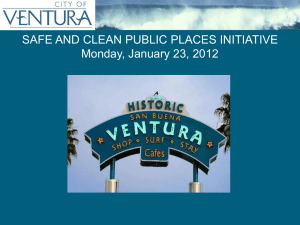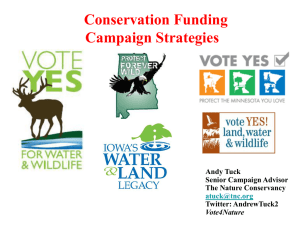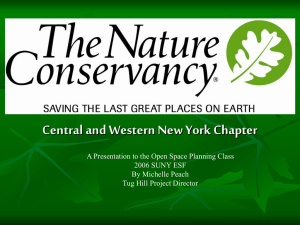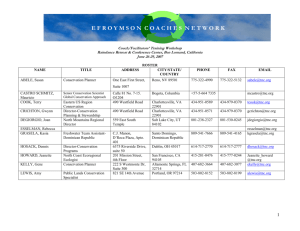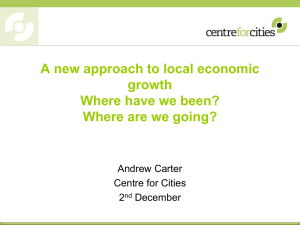What is a Partnership?
advertisement
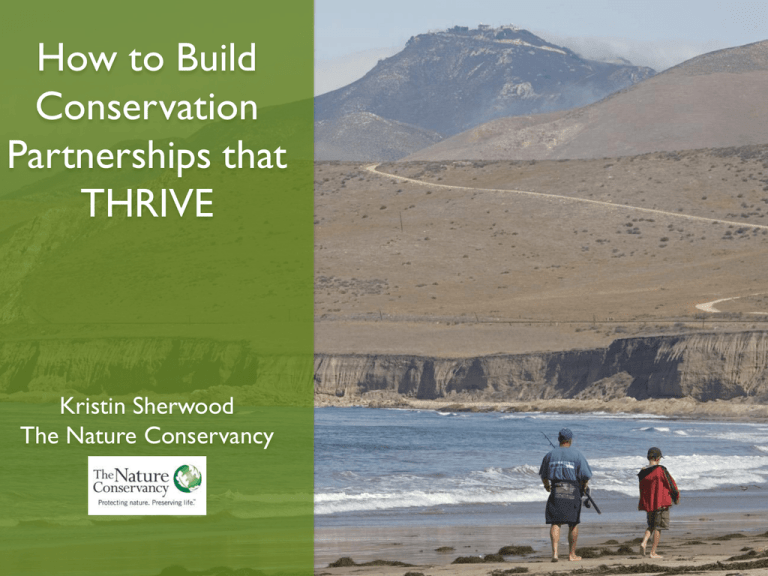
How to Build Conservation Partnerships that THRIVE Kristin Sherwood The Nature Conservancy we all work with partners we all are partners ourselves we all have experience to share we all have something to learn What is a Partnership? An ongoing working relationship where risks and benefits are shared. What is a Partnership, in practice? 1. Joint creation of projects 2. Commitment of tangible resources 3. Mutual accountability Lower Intensity/informal Shorter-term, informal relationships Shared information only Separate goals, resources, and structures EX: Associations, networks Higher Intensity/formal Longer-term effort around a project or task More durable and pervasive relationships Some planning and division of roles New structure with commitment to common goals Some shared resources, rewards, and risks EX: Coalitions, project teams All partners contribute resources and share rewards and leadership EX: Joint ventures A Strategic Approach to Partnership PREPARE CONCLUDE OR ADAPT MEASURE SELECT Strategic Approach to Partnerships NEGOTIATE MANAGE Preparing to partner 1 PREPARE To Partner or Not to Partner? • New ideas • Expanded scale • Exchange technical expertise • Provide, receive, or expand funding • Share data • Access to new constituents • Leverage influence 1 PREPARE • More time & cost upfront • Increased coordination & communication needs • Investment in maintenance • Increased risks: unproductive relationships, partners not meeting goals/expectations, etc. • Changing organizational visions and strategies Partnering as an Art? A Science? • Insight / imagination • Vision • People skills, i.e. flexibility, humbleness • Relationship building • Personal engagement 1 PREPARE • Technical knowledge • Negotiation/mediation/facilit ation • Critical analysis / thinking • Evaluation • Admin / project / financial management Selecting Partners 2 SELECT Partner Selection Process Define Objectives ID Key Criteria ID Orgs and Gather Info Narrow the List 2 SELECT Make a Decision Scoping Checklist Does the partner have… A good track record? Good standing in the field/sector? Wide ranging contacts and influence? Skills and competencies that compliment your org/other partners? Sound management and governance structures? A record of financial stability? A stable staff group? Current status Further actions 2 SELECT Negotiating Agreements 3 NEGOTIATE Spectrum of Partnership Documentation Less Formal: No documentation Oral Contract More Formal: Memorandum of Agreement or Understanding 3 NEGOTIATE Most Formal: Partnership Agreement Joint Venture Partnership Agreements • • • • • • • • • • Goals and expectations Roles and responsibilities Joint work plan Financing and resource contribution Fundraising Communications (including media) Decision-making structure Partnership review and measurement Long-term planning Exit strategy 3 NEGOTIATE Managing the Partnership 4 MANAGE Quick Tips for Successful Collaboration • Frequent communication, regular face-to-face meetings • Take some field trips. • Designate a coordinator or point person • Get your boots muddy working on something tangible. 4 MANAGE • Hire the right staff and clarify roles • Joint work planning • Manage conflicts and grievances • Celebrate small successes 4 MANAGE Measuring the Partnership 5 MEASURE What to measure? Operations Fulfillment of commitments Management External communications Transaction costs Set up Governance structure Agreements Sufficient resources Clear roles Right partners? Clear review process Partner Relations Internal communications Equity Transparency Institutional buy-in 5 MEASURE Why measure a partnership? • Predict early issues that could impact conservation outcomes • Potentially re-defining the partnership • Keeping people motivated and on-task • Changing activities & partners if required Concluding or Adapting 6 CONCLUDE OR ADAPT Concluding/Adapting • Tendency is to focus on the beginning, not the closure. • Most partnerships aren’t designed or meant to last long term. • All partnerships need to talk about the end at the beginning. “At some point, the relationship will be so different from the one envisioned in this partnership, it will be time for this one to end. A successful exit to this partnership will be when Big Sur Land Trust is so fully competent that it has little to ask from TNC and TNC has little to offer, and when the conservation projects of mutual interest are completed.” - Big Sur Land Trust – TNC Owner’s Manual A Strategic Approach to Partnership PREPARE CONCLUDE OR ADAPT MEASURE SELECT Strategic Approach to Partnerships NEGOTIATE MANAGE Partnering works best when groups: •Take time to build strong working relationships •Deal with difficulties rather than ignoring them •Develop genuine concern for each other’s •Balance a flexible with a rigorous underlying interests approach •Do more listening than talking •Focus on practical and sustainable •Develop good communication skills at all results levels Resources • • • • TNC Conservation Partnership Center World Wildlife Fund – UK Partnership Toolkit The Partnering Initiative The Fieldstone Alliance GOOD LUCK WITH YOUR PARTNERSHIPS!!
